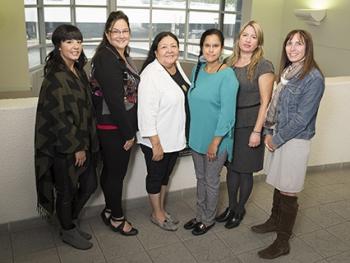Image Caption
Summary
By Shari Narine
Windspeaker Contributor
EDMONTON
When the Alberta Teachers’ Association (ATA) hosts its 10 conventions in February and March, teachers will learn about the Indian residential school experience from a thriver.
“I’m very much a thriver. I love that word thriver. I’m affected. My mom went to residential school and so I was affected,” said Hali Heavy Shield, who takes issue with calling former residential school students ‘survivors.’
“We need to start changing that narrative. There are a lot of very successful, healthy role models out there and our children need to be exposed to that. There needs to be more stories being told about the good work of our leaders, while acknowledging that ‘yes, all of this (residential school trauma) is going on. This is part of the messiness, part of the process of reconciling’.”
Heavy Shield represents Treaty 7 as one of six consultants tasked by the ATA and Alberta Education, along with three other professional education associations, to create a program that will be required learning for teachers.
Walking Together: Education for Reconciliation Professional Learning Project workshop will be part of the standards for teachers to maintain their provincial certification.
Walking Together was created as a joint commitment to action by Alberta Education in response to the Truth and Reconciliation Commission’s calls to action, said Andrea Berg, ATA executive staff officer, government.
“There’s a new standard in the teacher quality standards (TQS) related to understanding and applying foundational knowledge of First Nations, Métis and Inuit. We are providing professional development and resources to teachers to help them meet this new standard,” said Berg.
In the future, she adds, every teacher’s personal growth plan will reflect this new aspect of the TQS. The revised TQS has not yet been approved by Alberta Education.
A $2.5 million grant over three years will allow the consultants to create and refine training workshops for teachers. Berg said the intention is to create a train-the-trainer model, which will allow all of the 45,000 teachers across the province to be reached. She anticipates schools or school divisions with First Nations, Métis and Inuit program leaders would be the ones to receive the training.
“(The consultants) are very optimistic. They’ve been waiting for this type of work for a long time to happen. That’s the sentiments they’re hearing from the field as well: it’s about time,” said Berg. “Everybody is very passionate and very excited.”
Heavy Shield says she jumped at the opportunity to be part of the development team, which began its work in September 2016.
A member of the Blood Tribe, Heavy Shield has taught both children and adults on the Kainai Nation for 10 years. Now she will be teaching teachers about residential schools and their legacy; treaties; land-based knowledge; language; culture; history; and traditions.
All learnings will be “contextualized,” said Heavy Shield, so teachers will be knowledgeable about the Indigenous peoples that live in their specific region.
To develop the training workshops, the consultants are meeting with Elders, knowledge keepers, specialists and communities to determine how they define foundational knowledge and what they think is important for teachers to know. This information will be combined with a document from Alberta Education which defines what the government considers to be foundational knowledge.
“We have started the conversation all over the province. So we’re using some of the stories, but it’s mostly making a connection between the ATA and the Elders and making sure we follow protocol,” said Heavy Shield, adding these discussions will be ongoing.
Heavy Shield is enthusiastic about Walking Together and about the changes that will be coming to the Alberta curriculum. She says schools have been receptive to the program and teachers, who have been asking for help for a long time, are pleased to have something available.
Heavy Shield is also enthusiastic about the role she has to play, pointing out her work is important, especially considering Alberta had the most residential schools of any province.
“I really strongly believe that Creator puts us in the place where we need to be at the right time,” she said. “I feel very honoured to be part of this change that’s happening across this province.”

